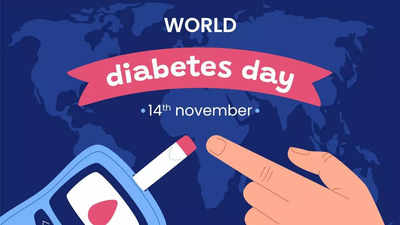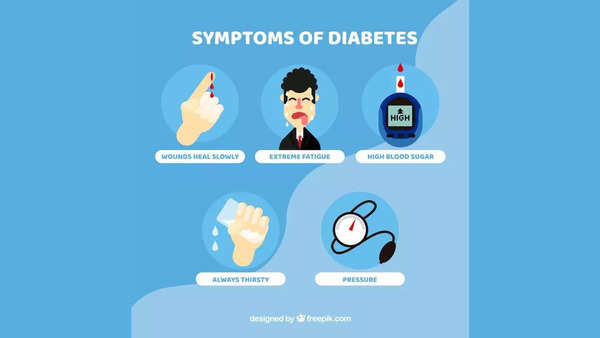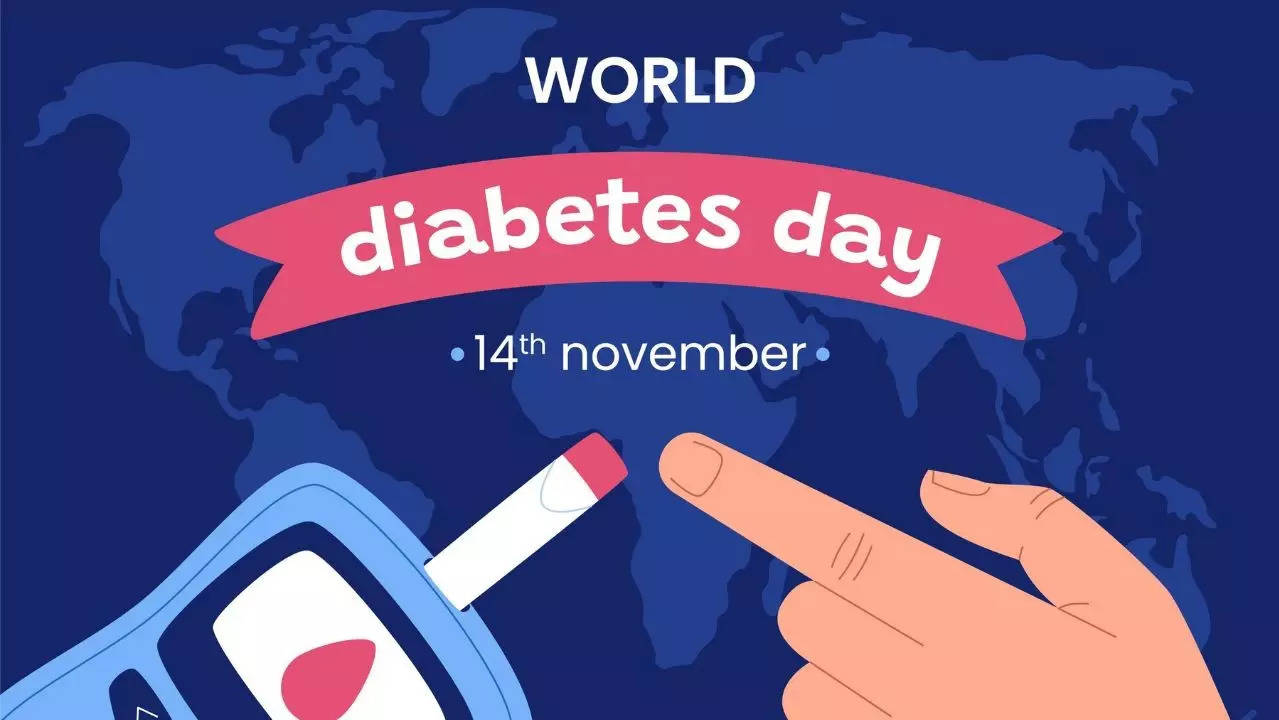Diabetes is one of the fastest growing health threats that need to be addressed to prevent its many complications later on in life. Like hypertension or high blood pressure, the progression of diabetes is often silent in nature. Many of its early signs are ignored by people and by the time they realise the danger, the damage is already done, which is often irreversible. Diabetes occurs when the body is not able to make insulin in sufficient amounts or utilize it well which leads to concentration of too much sugar in the body, which can in turn cause heart, kidney, lung, and brain complications.
What’s worrying about
type 2 diabetes
, which accounts for 85-95 per cent of all diabetes, is its asymptomatic period, which often leads to the disease being undiagnosed for several years.
Early signs of diabetes
often go unnoticed which leads to progression of the disease. Unexplained weight loss, fatigue, restlessness and body pain are common signs of undetected diabetes.
It is thus important to diagnose diabetes early to prevent long-term implications of the disease.
“The signs and symptoms of diabetes are disregarded by many because of the chronic progression of the disease. People do not consider this as a serious problem because unlike many other diseases the consequences of hyperglycemia are not manifested immediately. People are not aware that damage can start several years before symptoms become noticeable. This is unfortunate because recognition of early symptoms can help to get the disease under control immediately and to prevent vascular complications,” as per Indian Journal of Medical Research.
Uncontrolled diabetes can also increase risk of dementia with age. A study from the Lifecourse Epidemiology of Adiposity and Diabetes (LEAD) Center at the University of Colorado Anschutz Medical Campus, published in journal Endocrines suggests that young individuals with diabetes might face a significantly increased risk of Alzheimer’s disease as they age.
“Preliminary evidence shows that preclinical AD neuropathology is present in young people with youth-onset diabetes,” said the study’s lead author Allison Shapiro, PhD, MPH, assistant professor of pediatrics and endocrinology at the University of Colorado School of Medicine.
“These preliminary data suggest the potential for an early-onset AD risk trajectory in people diagnosed with diabetes in childhood or adolescence,” said the researcher.
Silent and surprising signs of diabetes
“Very often diabetes is asymptomatic and that is why it is called a silent killer. However, people can present with signs and symptoms which include genital itching, dryness of the skin, wounds which do not heal, extreme tiredness, fungal infections, fungal and bacterial infections or even occasionally with nerve paralysis like paralysis of muscle in the eye leading to restriction of eye movement or wrist drop, foot drop, facial palsy etc. which can be
surprising signs of diabetes
that people should know,” says Dr V Mohan – Chairman of Dr. Mohan’s Diabetes Specialities Centre, Chennai.
In very rare cases, diabetes may also be associated with cancer. “Very rarely diabetes may also be presented with cancer. For example, any diabetes presenting in an elderly person one should keep pancreatic cancer in mind,” says Dr Mohan.
Early signs of diabetes to notice
Symptoms of diabetes include excessive urination, excessive thirst, weight loss despite eating normal or more than normal amounts of food. It is important to identify these symptoms early and when these symptoms are present blood sugar should be checked and treatment should start as soon as possible.
Repeated skin or fungal infections could signal diabetes and it’s important to get your glucose levels checked. “Sometimes people with diabetes can present with repeated infections on skin, repeated urinary infections or fungal infection like candidiasis,” says Dr Ganesh Jevalikar, Associate Director, Paediatric Endocrinology, Max Super Speciality Hospital, Gurugram.
Is your weight loss due to diabetes?
If you have lost a lot of weight of late without any exercise or dietary change, it isn’t a good news as it may be a red flag for diabetes, particularly Type 1.
“When your body doesn’t produce enough insulin (or any insulin at all), it can’t use glucose for energy. As a result, it starts breaking down fat and muscle tissue for fuel, leading to significant and rapid weight loss. This can happen even if your eating habits haven’t changed. For Type 2 diabetes, while weight gain is common, some individuals may experience weight loss as the body fails to utilize glucose properly,” says Dr. Satish Koul, Senior Director & Unit Head – Internal Medicine, Fortis Gurgaon.
Increased hunger
Despite eating enough, individuals with diabetes may feel excessively hungry. This occurs because the body’s cells aren’t getting the glucose they need for energy, sending signals to the brain that you’re hungry. This increased appetite, often accompanied by weight loss, can be one of the earliest signs of diabetes, adds Dr Koul, who also discusses other key early signs of diabetes.
Increased thirst and frequent urination
When blood sugar levels are high, the kidneys try to filter out the excess glucose, resulting in increased urine production. This leads to dehydration, prompting the individual to drink more fluids, which, in turn, leads to even more frequent urination.
Blurred vision
High blood sugar levels cause the lens of the eye to swell, changing its shape and impairing the ability to focus. This blurriness may come and go, but if left untreated, prolonged high blood sugar can lead to permanent damage to the blood vessels in the retina, resulting in diabetic retinopathy, a leading cause of blindness.
Persistent fatigue
Feeling unusually tired or fatigued, even after getting adequate rest, can be another early sign of diabetes. When your body can’t properly convert glucose into energy, it leaves you feeling drained.
Slow healing of wounds and frequent infections
High blood sugar levels can impair circulation and damage nerves, which in turn slows down the healing process. This is why individuals with diabetes often notice that cuts, bruises, or sores take longer to heal. Additionally, high glucose levels create an environment conducive to bacterial and fungal infections. Women, in particular, may experience frequent urinary tract infections (UTIs) or yeast infections due to excess sugar in the urine, which feeds bacteria and yeast.
How to diagnose diabetes
A range of screening methods are suggested for diagnosing diabetes that can identify abnormal blood glucose levels. In the oral glucose tolerance test (OGTT) fasting and 2-hour post-glucose readings are taken to find out impaired fasting glucose (IFG), impaired glucose tolerance (IGT), or confirm diabetes. Diabetes is diagnosed if fasting glucose exceeds 126 mg/dl or if 2-hour glucose levels surpass 200 mg/dl. Glycosylated hemoglobin (HbA1c) testing is also recommended for diabetes detection when the values of your test are greater than 6.5%. Prediabetes is diagnosed when HbA1c levels are between 5.7% and 6.4%. Screening for undiagnosed type 2 diabetes is suggested for women during their first prenatal visit in case of risk factors. Gestational diabetes screening occurs between 24-28 weeks of pregnancy.
(Pictures courtesy: Canva, iStock)
Kidney disease: Identify these symptoms and act swiftly
I’m Manas Ranjan Sahoo: Founder of “Webtirety Software”. I’m a Full-time Software Professional and an aspiring entrepreneur, dedicated to growing this platform as large as possible. I love to Write Blogs on Software, Mobile applications, Web Technology, eCommerce, SEO, and about My experience with Life.









